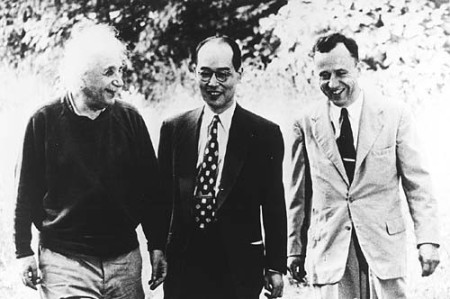Is observation critical to existence? Niels Bohr believed that it was the collapse of the wave function that gave particles like electrons their distinct reality. John Wheeler, who knew and worked with the great figures of quantum mechanics, summarized the gap between that point of view and Einstein’s by quoting three baseball umpires:
Number 1: I calls ’em like I see ’em.
Number 2: I calls ’em the way they are.
Number 3: They ain’t nothing till I calls ’em.
Michio Kaku reports this story in his book Parallel Worlds, noting this:
“To Wheeler, the second umpire is Einstein,who believed there was an absolute reality outside human experience. Einstein called this ‘objective reality,’ the idea that objects can exist in definite states without human intervention. The third umpire is Bohr, who argued that reality existed only after an observation was made.”
Image: Albert Einstein, Hideki Yukawa and John A. Wheeler. Credit: Johns Hopkins University.
Out of such conundrums John Wheeler made a career richly summarized in this New York Times obituary. I send you there for the details, from general relativity to black holes, but do want to preserve this quote:
“If there’s one thing in physics I feel more responsible for than any other, it’s this perception of how everything fits together. I like to think of myself as having a sense of judgment. I’m willing to go anywhere, talk to anybody, ask any question that will make headway.
“I confess to being an optimist about things, especially about someday being able to understand how things are put together. So many young people are forced to specialize in one line or another that a young person can’t afford to try and cover this waterfront — only an old fogy who can afford to make a fool of himself.
“If I don’t, who will?”
Addendum: Don’t miss Cosmic Variance‘s beautiful tribute.



His contributions were immense — and unlike other geniuses, he didn’t go off the deep end as he grew older. Humanity is the poorer for his loss.
There is an excellent tribute and follow up comments about
John Wheeler at Cosmic Variance here:
http://cosmicvariance.com/2008/04/13/goodbye/
Hi Folks;
John Wheeler was a man I had always looked up to. As a typical young boy, say in 2nd grade, I was impressed with the power of M-80 fire crackers, but when I had heard that he had worked on the Manhattan Project shortly there after, being a typical 2nd grader who liked heros, I was most awed at his great accomplishments after I had heard of his work on the theory of Black holes.
The genius of John Wheeler no doubt inspired a lot of careers in theoretical physics and especially in nuclear and sub-nuclear physics and he was a hero to many young grade school students who always would ask themselves the question of Why … ? to their parents regarding the fundamental workings of the world.
Humanity owes a great debt to giants like John Wheeler and I must say, I am proud that he is a member of the human race. In an age were human dignity and the value of human life is often questioned at any and every stage in its development, we can all look up to John and say “John. Job well done”. If anything, John’s fullness of humanity ought to help inspire in us all an ever greater sense of the value, dignity, and the sacredness of human life and a sense of self respect for what we as humans can do if we put our minds to it.
John Wheeler, Rest In Peace. I just hope I get to shake your hand on the other side oneday.
Thanks;
Jim